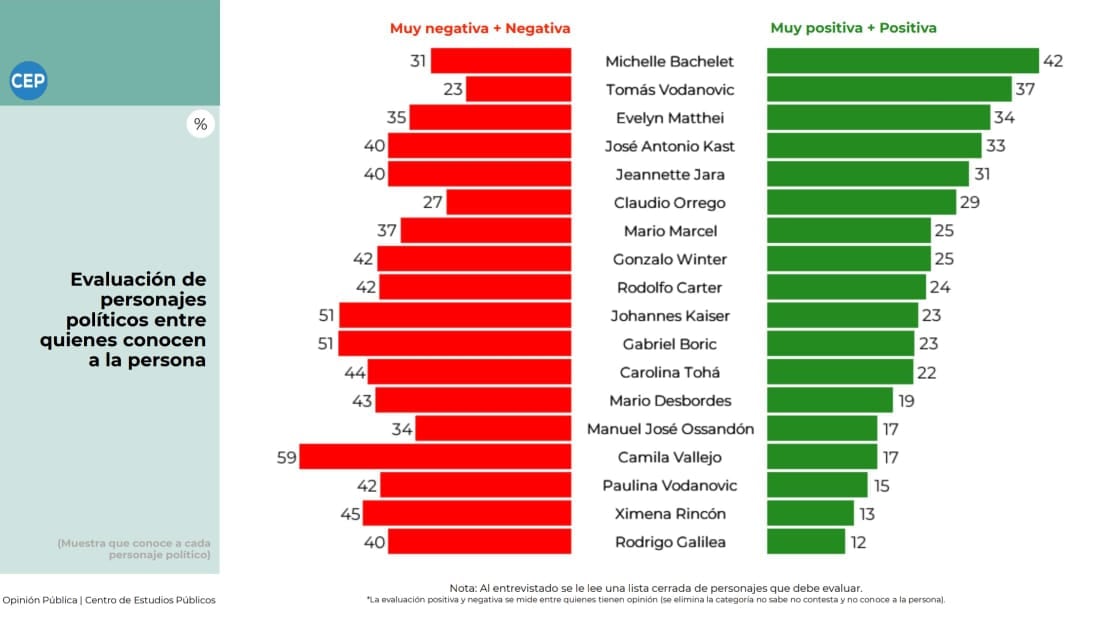Once in a while, the political landscape unveils a captivating narrative that intrigues and resonates with the masses. In the realm of Chilean politics, a recent survey conducted by the Center for Public Studies (CEP) has brought to light intriguing shifts in public opinion regarding key political figures. At the forefront stands the former president, Michelle Bachelet, basking in the glow of the highest approval ratings. Her presence in the political arena continues to command respect and admiration, with a notable 42% approval rating among surveyed individuals familiar with political personalities. However, the flip side reveals a 31% negative evaluation, indicating a mixed sentiment among the populace.
As the spotlight shifts, we encounter Claudio Orrego, the Governor of Santiago, and Johannes Kaiser, a deputy and presidential candidate, grappling with a plummet in their approval ratings. The survey, conducted between May 9 and June 18, paints a vivid picture of the fluctuating tides of public opinion. Claudio Orrego, once a figure of relative acclaim, now faces a significant dip of nine percentage points in his approval rating, coupled with a six-point surge in disapproval. Similarly, Johannes Kaiser, representing the National Libertarian Party, witnesses a parallel decline of nine percentage points in approval, counterbalanced by an eight-point spike in negative evaluation. These shifts underscore the dynamic nature of public sentiment, constantly reshaping the political landscape.
Delving deeper into the survey findings, we encounter a diverse array of political figures navigating the ebb and flow of public opinion. The Mayor of Maipú, Tomás Vodanovic, emerges as a prominent figure, although experiencing a slight decline in approval from the previous survey. Evelyn Matthei, the presidential candidate from Chile Vamos, occupies the third position with a 34% approval rating, juxtaposed with a 35% negative evaluation. The rankings cascade further, encompassing a spectrum of political personalities, each grappling with their unique challenges and triumphs in the eyes of the public.
Expert analysis sheds light on the underlying factors contributing to these fluctuations in public opinion. The interplay of political decisions, public perceptions, and societal dynamics intricately weaves the fabric of approval and disapproval ratings. Furthermore, the evolving landscape of Chilean politics reflects broader trends in governance, leadership, and public engagement. As political figures navigate this complex terrain, the CEP survey serves as a barometer, capturing the pulse of the nation and offering insights into the shifting dynamics of political favorability.
In this intricate tapestry of political evaluations, we witness not just individual trajectories but also the interconnectedness of public sentiment and political discourse. The rise and fall of approval ratings mirror the fluidity of public opinion, influenced by a myriad of factors ranging from policy decisions to personal charisma. As the political saga unfolds, each twist and turn offers a glimpse into the intricate dance between leaders and the led, shaping the future trajectory of Chilean politics.
In conclusion, the CEP survey serves as a mirror reflecting the multifaceted landscape of Chilean politics, where figures like Michelle Bachelet shine brightly amidst the shadows of fluctuating approval ratings faced by others. This dynamic interplay of public opinion and political leadership underscores the ever-evolving nature of democracy, where the voices of the people shape the course of governance. As Chile continues its journey of political evolution, the narratives of approval and disapproval form a rich tapestry, revealing the complexities and nuances of public perception in the realm of politics.

